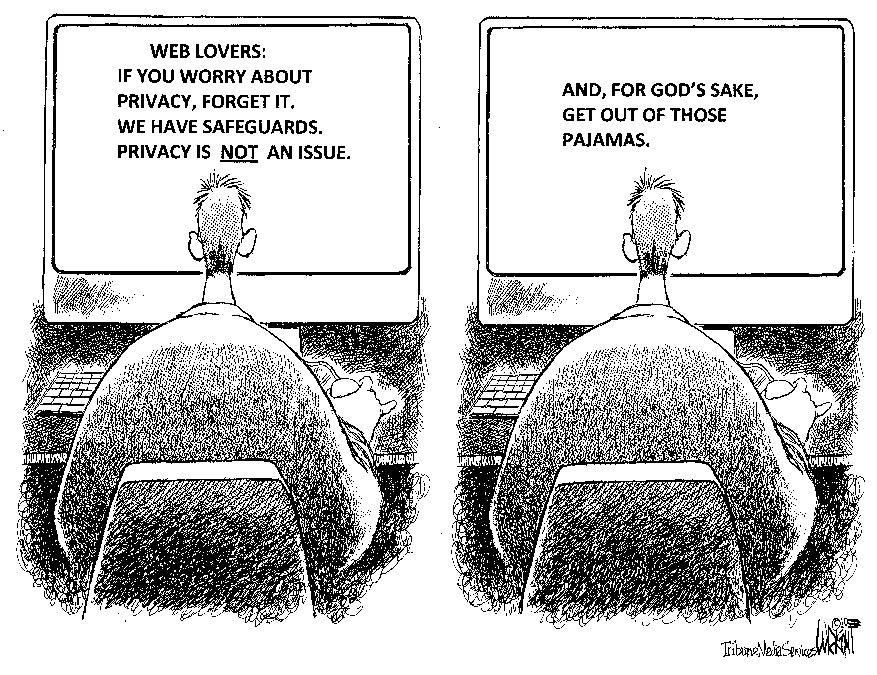
Attention, Facebookers: It’s not always necessary to let the world know what you’re doing. I would rather not know you’re updating your status from the toilet and you regret slathering so much hot sauce on your California burrito. I would rather not know you just had sex with your girlfriend and this escapade was significantly more experimental than the last.
Believe it or not, there is such a thing as over sharing. To be fair, I can relate to your compulsive infatuation with social media. I understand feeling the griping need to log onto Facebook or Twitter whenever something even remotely interesting happens. After all, not only are we residents of the information era, but the first generation of digital natives. I get it.
But that’s no excuse, especially when our habit of incessantly updating the world on our whereabouts is making us vulnerable to online predators. No, I’m not being paranoid. One in five Americans (19 percent) has been affected by online stalking or “aggressive outreach attempts” according to a recent study released by the National Cyber Security Alliance. Persistent emails, identity theft and harassment are all prime examples of cyber stalking. For a reason I can’t quite pinpoint, a significant number of Internet users, specifically younger audiences, appear remarkably unconcerned with the existence of virtual “creepers.” It seems as though such perpetrators are perceived more as mythical monsters or cyber legends than actual human threats.
I’m not going to insult your intelligence by pretending I’ve been any less careless. Granted, I’m not one to display super private details of my life online, but I do use Facebook’s “check-in” feature once in a while and I have my date of birth, hometown and college information on my profile. Even though my Facebook is completely private and I only add people I know personally, someone on my friend’s list could hypothetically take advantage of my openness and subsequently exploit my information with unnerving, relative ease.
Imagine if all of the information you post online was to fall into the wrong hands: where you go to school, what city you live in, who your family members are, your place of employment, your age, where you work out, etc. We are often comforted by the thought that our personal details are guarded behind our profile privacy settings, isolated from middle-aged perverts, psychotic exes and 20-year-old strangers who spam our inboxes with what they conceive are charming one-liners.
Inarguably, the Internet is full of eye-boggling things and people. (The pictures and videos you stumble upon on YouTube and Tumblr should be proof enough of that.) So why do we continue to make ourselves so susceptible to cyberstalkers? Is it enough to make our profiles private or are there some details about our lives that would be safer and wiser to exclude altogether? “Cyber criminals are more resourceful than ever. This data supports an ever-increasing need for online users to be vigilant in their actions each day,” Executive Vice President of McAfee John Thode said in the report.
Ultimately, you can never be too cautious when sharing your private life with the online community. Little profile tweaks, such as omitting your year of birth, email address and phone number, are a good start. In addition, remove everyone from your friends list whom you don’t know personally and refrain from adding people you have never met. Remember that this is not a popularity contest and you are not 13 years old. Your privacy should be your primary priority.
The next step is to be vigilant about the photos you post online. Pictures of you passed out drunk on the floor do not need to be on the Internet. Neither do half-naked photos of you at a rave. These are the kinds of pictures that come back to haunt you when you begin applying for jobs. Furthermore, avoid checking into places you frequent often, such as taco shops, coffee shops or the gym. Don’t make it easy for online stalkers to map out your routine stops.
Finally, keep one last thing in mind: You might give your phone number to a cute girl or guy you chatted with on the trolley or at work, but you wouldn’t feel comfortable handing them a list outlining where you live, eat, study and work out, would you? By connecting with people on social networking sites, we are essentially inviting them into our worlds, into our private lives. The anonymity aspect of the Internet demands even greater caution, so don’t make the foolish mistake of believing your imprudence and habit of oversharing won’t come with consequences eventually.










